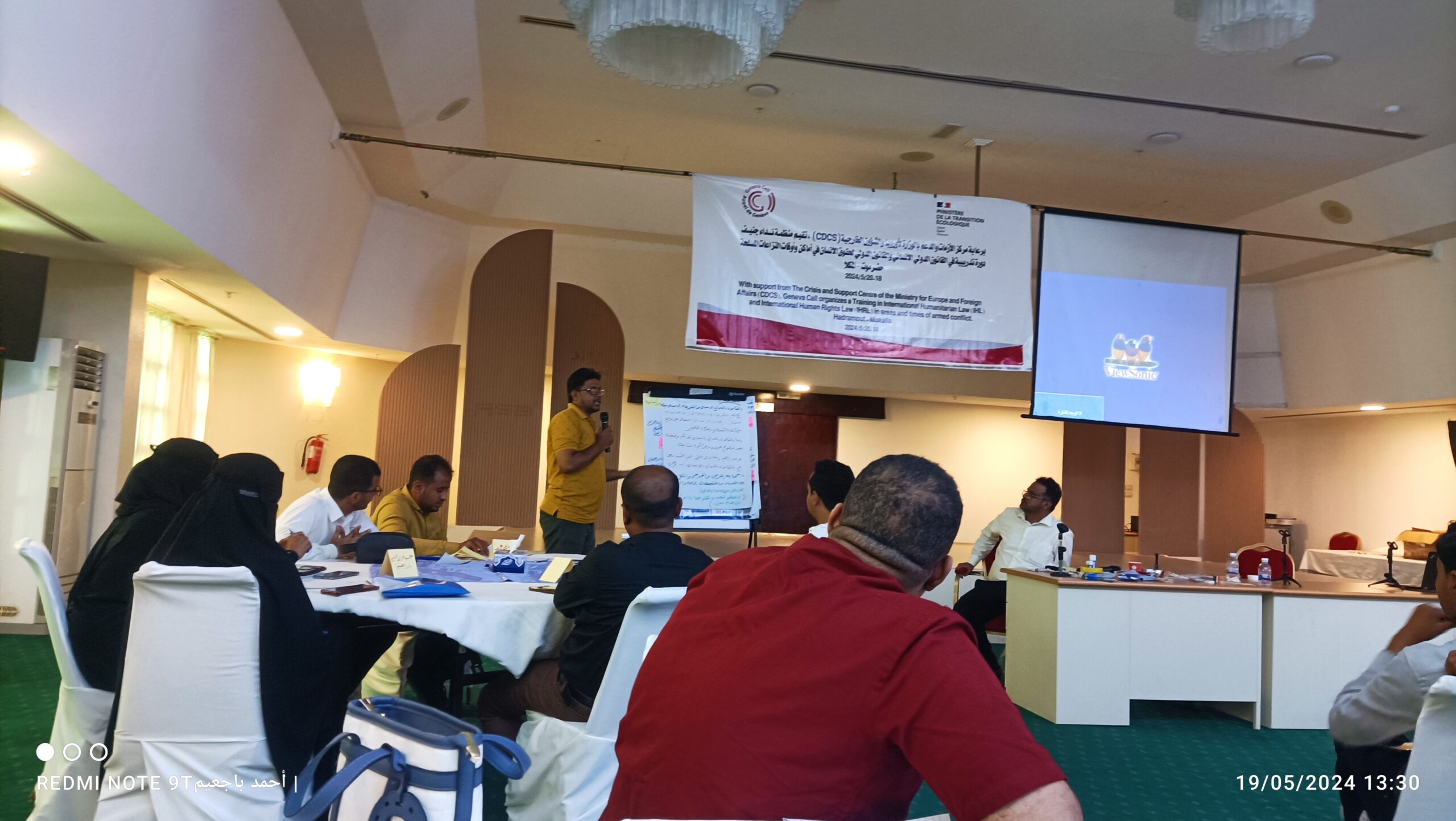Hanan Hussein – Women in Development and Peace
While Yemeni women have made progress in recent years, they still face significant challenges in achieving full equality, including their right to work in the public sector. They continue to encounter widespread discrimination in the labor market, including limited job opportunities, lower wages, unequal treatment, and other difficulties. However, does societal perception treat them fairly and guarantee their right to build and develop?
Reports and Statistics
A report published by UN Women stated that the situation of women and girls in Yemen is tough. The conflict has added layers of vulnerability experienced by women and girls, exacerbating existing gender inequality.
The 2014 Gender Gap Index ranked Yemen 138th out of 142 countries in terms of women’s economic participation and political empowerment. In 2017, Yemen was ranked last in the 2017 Gender Gap Index (144 out of 144 countries).
A research report by Sana’a Center for Strategic Studies summarized that in 2015, male employment declined by 11%, while female employment dropped by 28%. These figures varied at the local level. While female employment in Sana’a decreased by 43% due to the impact on both the public and private sectors, the number of working women in Aden rose by 11%.
Historically, women’s presence and leadership in government positions in Yemen has been very low. Yemeni women have the lowest rates of participation in formal paid employment. Additionally, women are highly vulnerable to various forms of violence, including forced and early marriage, according to a UN Women report.
Societal Perspectives
Some members of society believe that Yemeni women possess the skills and abilities to excel in any government role. They advocate for women’s involvement in the workforce, emphasizing its contribution to the Yemeni economy. They argue that women’s participation in public life improves society as a whole.

Others argue that women’s employment in the government sector conflicts with their primary role as mothers, wives, and homemakers. They prioritize women’s rights and responsibilities towards their husbands and families. They contend that women’s employment leads to family breakdown and social problems.
Alhan Al-Shaibani, an activist, emphasizes the importance of women’s role in government work: “I have a positive and encouraging view of women working in the government sector. They are partners with men in all aspects of life, both socially and professionally.”
She adds: “Society should accept women like men in the government and private sectors. They should be given their full rights to practice their work within the rights and obligations guaranteed by law. This will have a positive impact on society in general, and the sector they work in particular, as they are more receptive and preserve the tasks entrusted to them.”
Positive and Negative Differences
Shaima Ahmad, a medical report specialist at a government hospital, observes: “In my opinion, the government sector has employees from different age groups, social classes, and nationalities. Some individuals have cultural ignorance, despite their positions. They perceive women working in open and wide-reaching government jobs as accessible for building relationships. As a result, women are marginalized because society views them negatively. They may have entered the workforce, but in the private sector, they might find more educated individuals who are aware and appreciate women’s efforts and support them. Some institutions even give women positions and privileges.”
Amal Fuad, a manager in the banking sector, discusses the pros and cons of working in government offices:
“While the shorter working hours in government jobs may cause women discomfort in finishing their tasks, it is considered a major advantage. The tasks assigned to government employees are also relatively lighter. On the other hand, private sector jobs in large, professional organizations offer complete rights, privileges, and bonuses for employees, both men and women, despite the longer working hours.”
“Regarding the negatives highlighted by society, particularly for women, it’s the nature of government jobs that often require extra effort extending into the evening or participation in male-dominated gatherings (qat sessions). Additionally, men dominate positions and rights, leading to the marginalization of women in government offices.”
“In government jobs, rights, and privileges are linked to the position held. Some women have worked for years without receiving fair rights, while others obtained them through hard work and effort, but perhaps more quickly. There might be a role for connections and favoritism, as well as intelligence and cunning.”
Women’s Right to Public Employment
Alhan Al-Shaibani, an activist, believes women deserve a strong presence in the government sector: “Women’s right to work in the public sector is extremely important and significant. Giving them the right to hold these positions or tasks achieves many achievements for these institutions due to their commitment to fulfilling all their duties and work.”
“Women deserve to be in the government sector as the law has granted them full rights to do so, exercise their work, and receive promotions in the positions they hold.”
“In the current situation of the country, we can say that privileges have decreased in some government sectors and are only available in the private sector due to the repercussions of the conflict, which has led to the suspension of the civil service in recruiting new employees or implementing necessary promotions and raising job ranks. This has driven women to seek opportunities in the private sector, considering it fairer than government jobs. Some even leave their government jobs permanently.”
Wafa Awadh, an employee in a government ministry, highlights the crucial role women play in the public sector.
“Women work in all ministries and government institutions, and some hold positions of leadership. They are trusted, dedicated, and loyal to their work, and they are highly competent and responsible.”
The Influence of Women’s Presence
Shaima Ahmad emphasizes the positive impact women have on the public sector:
“Women in the public sector have a significant impact. They work without demanding bribes like men might, and they are genuinely dedicated and helpful without expecting anything in return.”
Alhan Al-Shaibani acknowledges the unique strength and influence women have gained during the conflict:
“Women have proven to be resilient and courageous, taking on new roles and responsibilities. They are not only mothers and wives but also influential figures within their communities. Many women have emerged as strong leaders, community activists, and peacebuilders.”
Alhan further explains: “Women have a powerful voice in their communities and are respected for their wisdom and leadership. They are supported and encouraged by their communities, and they are actively contributing to positive change.”
Research suggests that women in the public sector have a positive impact on both families and society. Working women contribute to providing additional income for the family, thereby improving living standards. They also serve as positive role models for their children and contribute to the overall improvement of women’s status in society.
Challenges and Obstacles
One of the most significant challenges faced by Yemeni women in the workforce generally has been the impact of armed conflict and its violent repercussions. Numerous studies and research have highlighted that the conflict has had a more detrimental effect on the female workforce compared to men.
Najla Husain, a teacher, believes that the most prominent challenges women may encounter in the public sector stem from the difficulty of balancing work and family life. Women in Yemen struggle to achieve this balance, particularly in the absence of affordable childcare services, further compounded by the low salaries paid to female teachers.
Najla adds, “Living in a remote area with limited transportation options, the difficulty of accessing transportation poses a major hurdle for me, especially in remote and rural regions. This makes it challenging for us to reach our workplaces easily and conveniently.”
Experts observe that women often encounter significant discrimination and prejudice within the Yemeni job market. This leads to widespread unemployment, limited job opportunities for women, and low wages and salaries. These challenges collectively contribute to a lack of gender equality.”
Societal Rejection
Alhan Al-Shaibani argues that there are several reasons why women are discouraged from joining the public workforce. Firstly, societal customs and traditions, imposed on women in general, as well as religious scholars who emphasize the prohibition of mixing with men, play a significant role. Secondly, women’s potential for excellence, success, commitment, and outperforming men can lead to them being targeted and prevented from advancing at the expense of men.
Among the challenges women face, Alhan mentions that the current state of the country presents a major obstacle, regardless of the proximity of the workplace. The most difficult aspect is the limited financial resources, which discourage women from pursuing careers in the public sector.
Shaima Ahmad explains that family disapproval is a frequent barrier to women’s participation in government institutions. Parents often fear for their daughters’ well-being based on negative experiences encountered by others. However, within specific departments, sectors, and communities, some support women in the workforce, recognizing their efficiency and diligence compared to men.
Certain customary practices and traditions in Yemen still prevent women from working outside the home, particularly in government positions. There are a significant number of women who lack familial support, making it challenging for them to balance work and family life.
Exclusion and Rights
Shaima Ahmad highlights the major obstacles women encounter in government institutions: “My colleague has worked in revenue collection for over 20 years but was only promoted recently to a position that did not adequately reflect her contributions. We see that women’s rights are violated, as they are denied promotions or bonuses. If any are granted, they are insignificant.”
She adds, “For over three years, I have only been recognized as a volunteer, without any formal contract or official acknowledgment of my employment, despite my years of service.”
Shaima addresses the issue of rights and privileges in the public sector: “There are significant differences in salaries and wages between men and women. When women demand equal treatment and compare their work to that of their male colleagues, they are told that men have responsibilities, families, and obligations that make them deserving of higher pay. However, women are neglected, and they are not deemed worthy of any financial increases because they are not perceived as carrying any responsibilities.”
Solutions
Alhan Al-Shaibani believes that while there have been some minor improvements in addressing the issue of women’s empowerment in the public sector, many Yemeni women are now working in private projects and sectors, not just government ones. Here, we cannot forget the role of organizations in assisting and supporting them to empower them economically.
She adds, “We look forward to highlighting the role of women in the government sector, giving them full rights to benefits, rewards, and promotions to encourage them and ensure they stay in their jobs.
Shaima Ahmad believes that the most important solutions may lie in organizing the administrative structure of facilities and awarding jobs to deserving individuals regardless of gender. The same applies to other rights and benefits, which contribute to supporting women in the public sector and preventing men from monopolizing positions.
Many experts suggest that laws should be enforced to protect women from discrimination in the labor market and ensure that they receive the same rights and opportunities as men. Among the most prominent solutions is addressing outdated customs, raising community awareness about the importance of women’s participation in the workforce, and providing women with a great deal of support and empowerment in their work so that they can work with confidence and professionalism.

